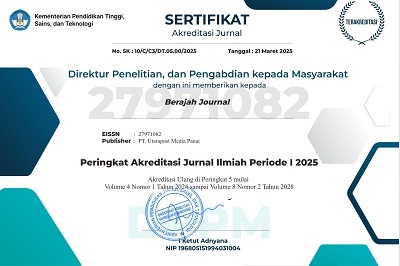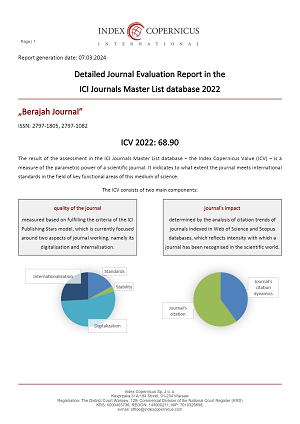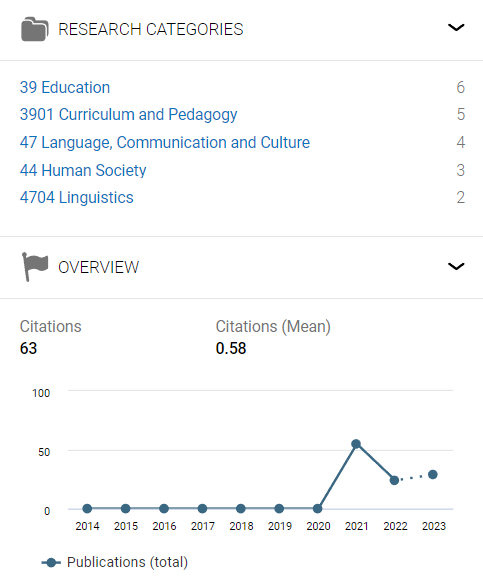UJI KEMAHIRAN BERBAHASA INDONESIA AKTIF RESEPTIF PADA SISWA SMA MUHAMMADIYAH KOTA SUKABUMI
DOI:
https://doi.org/10.47353/bj.v4i4.402Keywords:
Language skills, active receptivity, listening, readingAbstract
The Indonesian language proficiency training aims to assess both oral and written language skills, focusing on receptive active skills, namely listening and reading. These skills are essential as they provide the foundation for productive language abilities. Achieving high proficiency requires intensive and continuous practice. This is particularly important for students, as enhancing receptive active skills can significantly boost their academic performance. In this training, students from grades X, XI, and XII of SMA Muhammadiyah Kota Sukabumi participated. They were provided with intensive exercises, including both oral and written questions. The training utilized audio recordings containing spoken discourses, consisting of four dialogues and four monologues, accompanied by forty multiple-choice questions for each session. The training was conducted in two stages: first, students listened to the discourse, and then they answered multiple-choice questions related to it. Each discourse was followed by five questions, and the activity was carried out in two sessions. The results showed a range of abilities among the students, with significant improvement noted in the second session. For listening skills, the highest score achieved was 360 (excellent) and the lowest was 134 (average). In reading, the highest score was 297 (very good), and the lowest was 63 (limited). The training effectively improved the students' Indonesian language proficiency, particularly in listening and reading.
Downloads
References
Abidin, Y. (2012). Pembelajaran membaca berbasis pendidikan karakter. Bandung: PT Refika Aditama.
Ahmad Mukhsin. Strategi Belajar Mengajar Keterampilan Berbahasa. Malang.
Bachman, L. F. (1990). Fundamental Considerations in Language Testing. Oxford: Oxford University Press.
Beglar, D., & Nation, I. S. P. (2014). Assessing vocabulary. In A. J. Kunnan (Ed.), The companion to language assessment (pp. 172-184). Wiley-Blackwell.
Ibda, H. (2019). Pembelajaran bahasa Indonesia berwawasan literasi baru di perguruan tinggi dalam menjawab tantangan era revolusi industri 4.0. Jalabahasa, 15(1), 48–64. Mitra Media.
Kuntarto, N. M. (2010). Cermat Dalam Berbahasa Teliti Dalam Berfikir. Jakarta.
Nurgiyantoro, B. (1995). Penelitian dalam pengajaran bahasa dan sastra. Yogyakarta: BPFE.
Peraturan Menteri Pendidikan dan Kebudayaan Nomor 70 Tahun 2016 tentang Standar Kemahiran Berbahasa Indonesia.
Nurhadi. (2016). Teknik membaca. Jakarta: Bumi Aksara.
Solihah, A., & dkk. (2015). Latihan Soal UKBI. Jakarta: Transmedia Pustaka.
Sudaryanto, & dkk. (2019). How foreign speakers implement their strategies to listen Indonesian language? Journal of Advanced Research in Dynamical & Control Systems, 11(07).
Sukenti, D., Tambak, S., & Fatmawati, F. (2020). Kompetensi Kemahiran Berbahasa Mahasiswa Program Studi Pendidikan Bahasa dan Sastra Indonesia Universitas Islam Riau. GERAM (Gerakan Aktif Menulis), 8(2), 86–96.
Tarigan, H. G. (2008). Menyimak sebagai suatu keterampilan Berbahasa. Bandung: Angkasa.
Tarigan, D. (2010). Teknik Pengajaran Berbahasa. Bandung: Angkasa.
Downloads
Published
How to Cite
Issue
Section
License
Copyright (c) 2024 Tanti Agustiani, Fauziah Suparman

This work is licensed under a Creative Commons Attribution 4.0 International License.




























